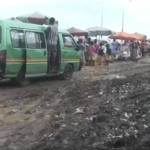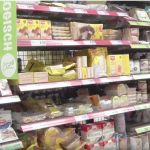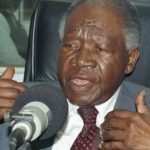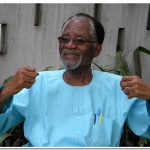Interview with Samia Yaaba Nkrumah
Posted by By Akogun Akomolafe at 7 February, at 12 : 00 PM Print
Warning: count(): Parameter must be an array or an object that implements Countable in /home/alaye/public_html/wp-content/themes/Video/single_blog.php on line 46
Warning: count(): Parameter must be an array or an object that implements Countable in /home/alaye/public_html/wp-content/themes/Video/single_blog.php on line 56
(Published in the NEW AFRICAN magazine, October 2009)
Samia Yaba Nkrumah was just six years when her father’s government was overthrown in a military coup. After a long sojourn abroad and a career in journalism and media consultancy, Samia returned to Ghana in 1987 and quickly joined her father’s party, the (CPP). Today she sits in Ghana’s parliament as an independent voice who refused to align with either the ruling National Democratic Congress, NDC, or the opposition New Patriotic Party, NPP.
In this interview, she bares her heart out on a wide range of issues.
Q1. Shall we begin by asking what it means to be the daughter of Africa’s favorite son, the legendary Osagyefo Dr. Kwame Nkrumah?
Being the daughter of Osagyefo Dr Kwame Nkrumah is a great privilege and a great honour. I’ve come to understand that it also means having a responsibility towards our people. That responsibility includes going back to seriously revisit his work, his legacy and what he tried to do, what he began doing and pick up from where he left. He left us a blueprint to restructure our economies and make us self-reliant with a strong agricultural and industrial base, to unify our continent to become economically viable, and to achieve total socio-economic and cultural emancipation. His works need to be revisited and his ideology needs to be demonstrated.
Q2. This year, the whole of Africa is celebrating your father’s centenary anniversary, can you tell us about your recollection of him as a father and also as a larger-than-life politician?
I have flashbacks of our father at home, sitting nearby reading a book, eating with his hand, carrying us, spooning honey into our mouths, taking our hands as we accompany him to the garden, down the steps. But we didn’t see that much of him but when he was around it felt like a normal family with him sitting with a book while we played around. I also remember some remarkable days like the day he was attacked in Flagstaff house by an imposter posing as a guard. I saw our father come up the stairs with a bloodied face, surrounded by many people. It was harrowing.
As a politician, I got to know him better after he was not with us when I started reading his books and listening to people who worked with him, who knew him and also our mother’s recollections. Discovering him really made me appreciate him better both as a father and also as a politician who had a vision and was capable of seeing the whole picture. He was a man who knew what he wanted to do and had it all planned. Not even his worst critic would ever describe him as selfish or petty-minded. And of course it didn’t take much to realize that his political thought was the answer to many of our problems
Q3. You were very young when the CIA-instigated coup toppled your father’s government, what do you remember from those harrowing days?
I remember 24th February 1966 very well because we were so indescribably terrified and so utterly confused. I remember waking up to the sound of gunshots, praying for safety upon our mother’s instructions, being wrapped in blankets and getting in and out of the car, ordered around by scared young soldiers, and all those soldiers pointing guns, shouting, confused. I remember particularly the gun held against Mother’s nape. It was utterly terrifying; the stuffs that nightmares are made of. And I know we were very lucky to leave on the same day, thanks to Gamal Abdel Nasser, the late President of Egypt who sent an Egyptair flight to take us to Cairo that very day.
Q4. What emotions do you still carry when you remember those very dark days, is it anger or sadness or both?
Today, I can put it in perspective. I think of it as a day in the life of a developing nation caught up in the Cold War dynamics. We dealt with the fear, the nightmares, the confusion and the loss of identity. To be able to engage in the politics of today, I had to wipe the slate clean. I cannot do what I’m doing today by harbouring resentment. What has happened has happened and we cannot undo it. As our elders say, ‘if you don’t forget yesterday’s quarrel, you will not have someone to play with.’ Revenge and vindictiveness are inadmissible in politics, I believe. At least politics as we’ve known it in the Nkrumah family; that is the politics of giving, of serving, of loving our people. And really these are not superficial sentiments. You know Nkrumah never approved the execution of any Ghanaian, not even those who were proven to have attempted to assassinate him. In Guinea, after the coup he refused to sanction an attempt to attack Ghanaian forces to wrestle power from the NLC. He would never approve of the shedding of a single Ghanaian or African or any Human blood.
Q5. A lot of associates disowned your father after the coup, are there people you’d like to acknowledge as standing by him and helping your family out in those turbulent days?
Many people helped us over the years. In fact, there wasn’t a period in my life when people didn’t help. Governments helped, individuals helped, family members helped. The list is long and I wouldn’t want to miss any one. Gamal Abdel Nasser, Sekou Toure, Amical Cabral, and many other leaders stood by Nkrumah. But one person comes to mind more than others today as I’m speaking and that is June Milne, our father’s literary executrix, who is now over 90. She went to Guinea from England 16 times, stood loyally by Nkrumah, rescued precious papers after his death, and helped publish his books some posthumously. And she introduced me seriously to Nkrumah’s thoughts and told me so much about him and gave me all his books. When I understood what Nkrumah stood for and tried to do, the vision he left us, everything else fell into sharp focus as if someone was telling me: “this is the way, walk in it.”
Q6. Have you met any of the people who conspired against your father, if not why not?
I met some who betrayed him, some who’ve insulted him, others who’ve pretended to be his followers, but not those directly implicated in assassination attempts, the 1966 coup, etc. But as I’ve said, I’m not taking any of this personally. One day in parliament, I sat silently listening to the two parties (the ruling National Democratic Congress, NDC, and the opposition New Patriotic Party, NPP) trading accusations as to which party treated our Mother worse. I even had to listen to an MP saying I was a toddler and couldn’t remember what happened. I could have told them the whole story, who did what, but I thought that’s not why I’m here. We know what happened, how and why, and what we know only serves to make us stronger, more real and more in tune with our people’s needs and aspirations. It also helps to make us more focused on the job that we are doing.
On our part, we have forgiven those that trespassed against us and conspired against our father. We have buried the hatchet.
Q7. The Rawlings, Kufuor and the Mills governments have all tried (still trying) to rehabilitate your father’s legacy, what are your feelings about their efforts?
We need more action than pronouncements or symbolic gestures even though the latter could rekindle interest. Nkrumah was vilified and demonized for so long that it will take some time before he is fully vindicated but we are getting there. Former President Rawlings oversaw the construction of the Kwame Nkrumah Mausoleum in Accra. Former President Kufuor presided over our Mother’s state funeral in 2007 and footed her hospital bill before her death. He also welcomed us back to Ghana and myself into political life. Now Pres. Mills, who was a Young Pioneer, I’m told, declared 21 September Founder’s Day pending, of course, parliament’s approval. This is, of course, the greatest honour done Nkrumah yet. But how close we’re getting to restructuring the economy, to taking practical steps to promote African unity, I’m not so sure. Those are the things that were very dear to my father’s heart and it’d be nice to start implementing them. We’ve lost a lot of ground but it’s never too late to start. I also believe that his books should form part of curriculum of our educational institutions. Now of course President Mills did his stint as a Young Pioneer, so let’s wait and see.
Q8. The government of Ghana set up a committee to celebrate Nkrumah’s birthday, did they ask for any input from you or any of your siblings?
Sekou Nkrumah, our youngest brother, who joined the NDC a year and a half before the elections is a member of the committee. I was not asked to join but the Chairman of the committee asked me to become directly involved in their activities and I assured him of my cooperation. I’m not in this business out of personal interest or short term gains and I think we will be judged by our actions.
Q9. Can you describe for us the current state of affairs in the House of Nkrumah? What is your relationship with your siblings?
I love my three brothers, of course, and no political differences will ever change that. Gamal Nkrumah is very supportive of my every move, politically speaking, and we remain very close. Sekou criticized me openly during the campaign, but I’ve taken it in my stride and he’ll always be my brother and his children are mine. As to be expected, many people tried to read too much into our political differences, but they are just that – political differences. Our eldest brother, Professor Francis Nkrumah, has always been a friend.
Q10. Let’s talk about yourself, who is Samia Nkrumah. Are we just seeing the pretty daughter of a legend, or is Samia a woman of substance in her own rights? What have been your accomplishments?
I think our work in the years to come will answer that question better than anything I can say today. I’m an ordinary woman who is trying to make a meaningful difference in her people’s lives. I’m armed with a remarkable vision and strong spirituality. Till a few years ago, I lead a fairly quiet private life, until a resurgence of interest in Kwame Nkrumah, a gradual vindication of his work and vision forced us into action slowly but steadily. The more I had to explain about our lives and the life of Nkrumah as we knew it, the more it dawned on me that we have to answer a serious calling and demonstrate what he stood for, lived and died for, for the good of our people. I think I was finally left with no choice but to “go about our father’s business” practically and on the ground.
Q11. Your opponents during the last elections lambasted you as a career woman who’s just cresting in on her father’s famous name. The NDC candidate said he was contesting against your father and urged you to go back to Italy. What was your reaction then?
Our people will judge us by our actions. I’ve made and am still making some sacrifices to do what we’re doing. I haven’t chosen the easy way that’s for sure. But I’m guided by our father’s vision and spirit of doing things. Political opponents feel they have to say these negative things in campaigns. I never once retaliated or made personal attacks. I am not in politics to engage in petty, personal mudsling. The task before us is too big and too onerous to be focus on personal attacks. I’m really trying to do a different kind of politics in every sense. We’re not just being ego-less, sincere and committed but we also more interested in what we want to do and are doing for our people than in looking sideways at what others are doing or not doing.
Q12. What was your contribution to the community before you became MP?
I returned to Ghana literally to contest the elections. During the campaign, I made sure that we did not only talk ideology, but that we engaged in small projects. Most of the people who voted for us lack basic social needs, modest education, no clean drinking water, poor sanitation, unreliable or no electricity supply, very inadequate infrastructure and it hits you, especially if your political orientation puts your people’s welfare as a priority. Today, you cannot be an effective politician if you are not dynamic, if you cannot be engaged in social programmes. This is not the era of talking but of walking your talk. We cannot persuade by argument but by action. The pace of our work, my outfit and myself, has not changed during or after the campaign. We’ll remain close to our people.
Q13. It’d be grossly unfair to compare you to your illustrious father, but what is Samia bringing into Ghana’s politics and also to the concept of African unity which was your father’s great passion?
I am bringing fresh ideas to realize the objectives on Nkrumahism. Look, Femi, Nkrumah devoted his life analyzing and proffering solutions to make Africa self-reliant. His was a holistic approach to totally emancipate Africa, politically, economically and culturally. He created the blueprint that would catapult our continent to the rank of developed world. Sadly, he was killed before he could realize his dreams. But fortunately for us, he left behind the blueprints that will guide.
Q14. It goes without saying that there has been a total failure of leadership in Africa since your father’s death. It is like the last four decades have been totally wasted. What we have had over the years are self-seeking, insanely corrupt leaders totally bereft of ideas or visions, how do you think that this can be rectified?
All that is true but we need not be too distressed. The greatest tragedy we could inflict on ourselves as Africans is to succumb to Afro-pessimism. My father believed that Africa does not have a problem that Africans cannot solve; it’s a belief that I passionately share. We have the resources, both human and material, to lift our continent up. The only thing lacking is a core of patriotic and utterly selfless leaders in many parts of Africa. Ghana cannot go it alone; neither can Nigeria or even South Africa. But we need a few courageous, committed, dedicated and utterly selfless leaders who are prepared to make the huge sacrifices that are necessary to enable us overcome our challenges. Africa need long-sighted and strategic thinkers like my father and I believe that we are in the process of getting there.
Look, we are making stride. Until few years ago, my father’s name was vilified; today the African Union has recognized his contribution so much so that his birthdate is to be recognized continent-wide. That is a quantum leap from the very recent past when his name was associated with evil and tyranny.
Our people have realized that we cannot rely on others to lift u sup. We needed help from wherever we can get it, but we have to start by doing things for ourselves first. As another African proverb puts it: ‘it’s the child which raises his hands that the mother will carry.’
Q15. A follow-up to the last question is what is your own agenda for your constituency? What should the people of Jomoro expect from their new MP?
Look, Femi, Jomoro is a very poor constituency even by Ghana’s low standards. There are a lot of challenges like poor sanitation, access to clean water, schools, hospitals and a host of other things. I just came back from there and sadly the whole place has been devastated by unremitting flood. I have donated some emergency relief materials. But that’s on the humanitarian side of things. We have plans afoot to build concrete structures that would enable people to live decent lives.
Our people are not infirmed who need to be spoon-fed, what they need are the basic structures to enable them live the lives they wish to live. That was what my father recognized early. He was not planning some Utopian state where people will rely on government charities or welfare. We shall try to build on that. The Jomoro I met is certainly not going to be the Jomoro you are going to be seeing in the next few years.
Q16. Ghana is effectively a two-party state, what informed your joining your father’s party, the Convention People’s Party (CPP) whose fortunes have dwindling over the years. How do you intend to realize your political ambitions and objectives if you remain in a party that is clearly in limbo?
I joined my father’s party because I believe very passionately in his philosophy. I am a die-hard Nkrumahist. You see, my father worked very hard and his work was very important to him. And as a faithful disciple, I would like to carry on the torch that he lit. We have plans to totally restructure the CPP. What people failed to realized is that until a few years ago, the CP name was banned in Ghana and its offices and assets were confisticated. We shall try and build the party from ground up, just the way Nkrumah did. I can assure you that a new CPP will emerge after our Congress later this year.
Q17. What are your visions for Ghana and also for Africa? What are you and the new generation leaders in Africa bringing to the table?
I believe that we are bringing honesty, passion, commitment and dedication. We are appalled by the thirty or so years we lost since my father’s death. But thankfully, our work has been cut out for us by the monumental work and blueprints he left behind. We only have to revisit his works, re-read his books and blueprints and everything shall fall into place.
Q18. Would like to be the president of Ghana?
It is too early to even begin to entertain that notion. I am a relatively novice in politics. My father didn’t seek the mantle of leadership until he felt he was totally ready – emotionally as well as intellectually. I have got a long way to go. My immediate objective is to bring unity to the party that he left behind for us. We shall seek to rebuild the Nkrumah’s political structures that were decimated by his opponents after they overthrew him. We also will seek to rehabilitate him as we believe that he was unjustifiably vilified.
Q. Can you tell u something about your mother, Madam Fathia?
My mother was a very courageous woman and she was indefatigable. You know that she never had an easy life. You have to remember Africa of the 1957s. Not many Egyptians knew where Ghana was then, so it came as a shock when mother said that she was going to marry a Ghanaian. Her family was not enthused when she announced her decision, but she stood firm. She genuinely loved my father. My father’s friendship with President Gamal Abdel Nasser must have helped to smooth things over by his decision to open a full embassy in Accra.
I remember Mother as a very optimistic person who, although totally apolitical, stood steadfast by our father. She was totally committed to what he was trying to do. She believed in him and helped him by nurturing the family and bringing up the children. Of course, the coup both shocked and devastated her. You remember that father was abroad when the army struck. She was alone with us when the soldiers started shooting up the place and they put a gun to her neck. It was a frightening experience for all of us.
I remember that she wanted us to live and experience part of our Ghanaian heritage, and that was what informed her decision to bring us down in 1975 to live in Ghana. I remain thankful to President Kufuor who later took good care of her when she was sick. It was also gratifying that his government gave her a state funeral.
About the Author
Femi Akomolafe is a passionate Pan-Africanist. A columnist for the Accra-based Daily Dispatch newspaper and Correspondent for the New African magazine. Femi lives in both Europe and Africa, and writes regularly on Africa-related issues for various newspapers and magazines.
Femi was the producer of the FOCUS ON AFRICANS TV Interview programme for the MultiTV Station.
He is also the CEO of Alaye Dot Biz Limited Dot Biz, a Kasoa-based Multimedia organisation that specialises in Audio and Video Production. He loves to shoot and edit video documentaries.
His highly-acclaimed books (“Africa: Destroyed by the gods,” “Africa: It shall be well,” “18 African Fables & Moonlight Stories” and “Ghana: Basic Facts + More”) are now available for sales at the following bookshops/offices:
- Freedom Bookshop, near Apollo Theatre, Accra.
- The Daily Dispatch Office, Labone – Accra
- WEB Dubois Pan-African Centre, Accra
- Ghana Writers Association office, PAWA House, Roman Ridge, Accra.
- African Kitchen in Amsterdam Bijlmer
Where to buy them online:
On Lulu Books:
18 African Fables & Moonlight Stories https://goo.gl/Skohtn
Ghana: Basic Facts + More: https://goo.gl/73ni99
Africa: Destroyed by the gods: https://goo.gl/HHmFfr
Africa: It shall be well: https://goo.gl/KIMcIm
Africa: it shall be well
on Kindle books: https://www.createspace.com/4820404
on Amazon books: http://goo.gl/QeFxbl
on Lulu Books: https://goo.gl/SQeoKD
Africa: Destroyed by the gods
on Kindle books: https://www.createspace.com/4811974
on Amazon books: http://goo.gl/1z97ND
on Lulu Books: http://goo.gl/KIMcIm
My Lulu Books page: http://www.lulu.com/spotlight/FemiAkomolafe
Get free promotional materials here:
- Africa: it shall be well: http://alaye.biz/africa-it-shall-be-well-introduction-in-pdf/
A FREE Chapter of ‘Africa: It shall be well’ could be downloaded here: http://alaye.biz/africa-it-shall-be-well-a-free-chapter/
- Africa: Destroyed by the gods (How religiosity destroyed Africa) http://alaye.biz/africa-destroyed-by-the-gods-introduction/
A FREE Chapter of ‘Africa: Destroyed by the gods’ could be downloaded here: http://alaye.biz/africa-destroyed-by-the-gods-free-chapter/
Contact Femi:
Femi’s Blog: www.alaye.biz/category/blog
Website: www.alaye.biz
Femi on Amazon https://www.amazon.com/author/femiakomolafe
Twitter: www.twitter.com/ekitiparapo
Facebook:https://www.facebook.com/alayeclearsound;
Gmail+: https://plus.google.com/112798710915807967908;
LinkedIn: www.linkedin.com/in/femiakomolafe
Email: fakomolafe@gmail.com
Kindly help me share the books’ links with your friends and, grin, please purchase your copies.
Comradely,
Femi Akomolafe




